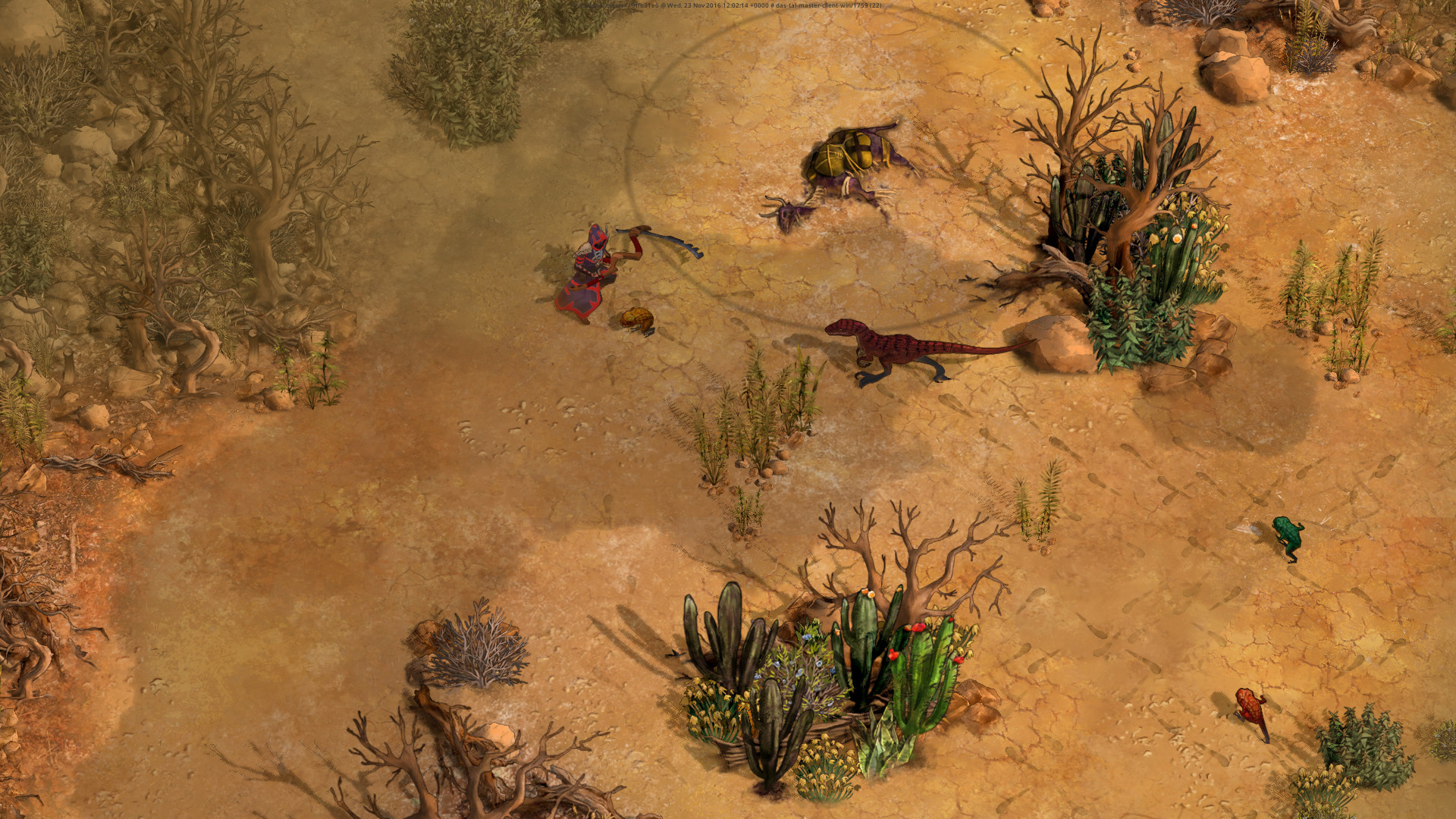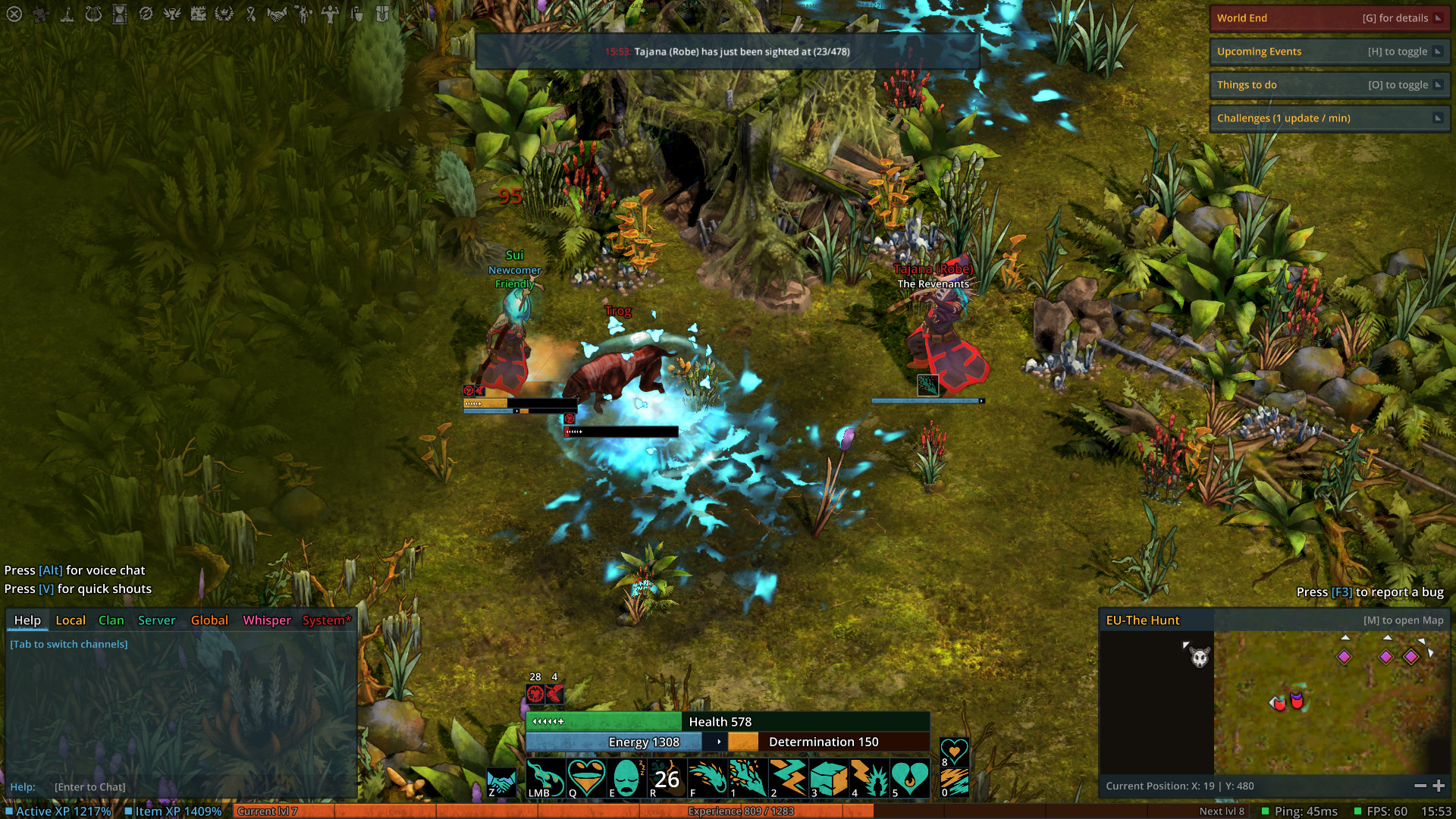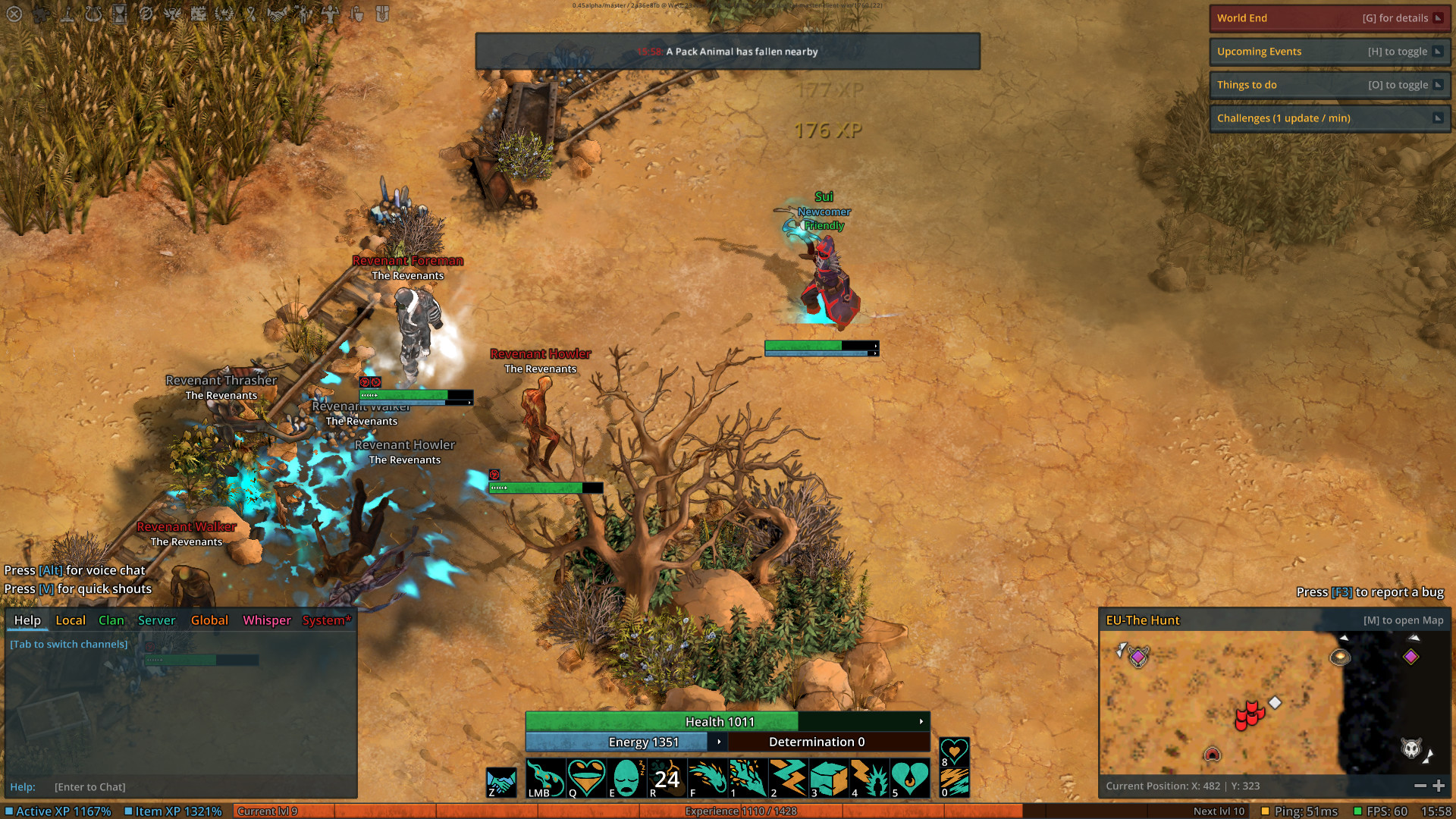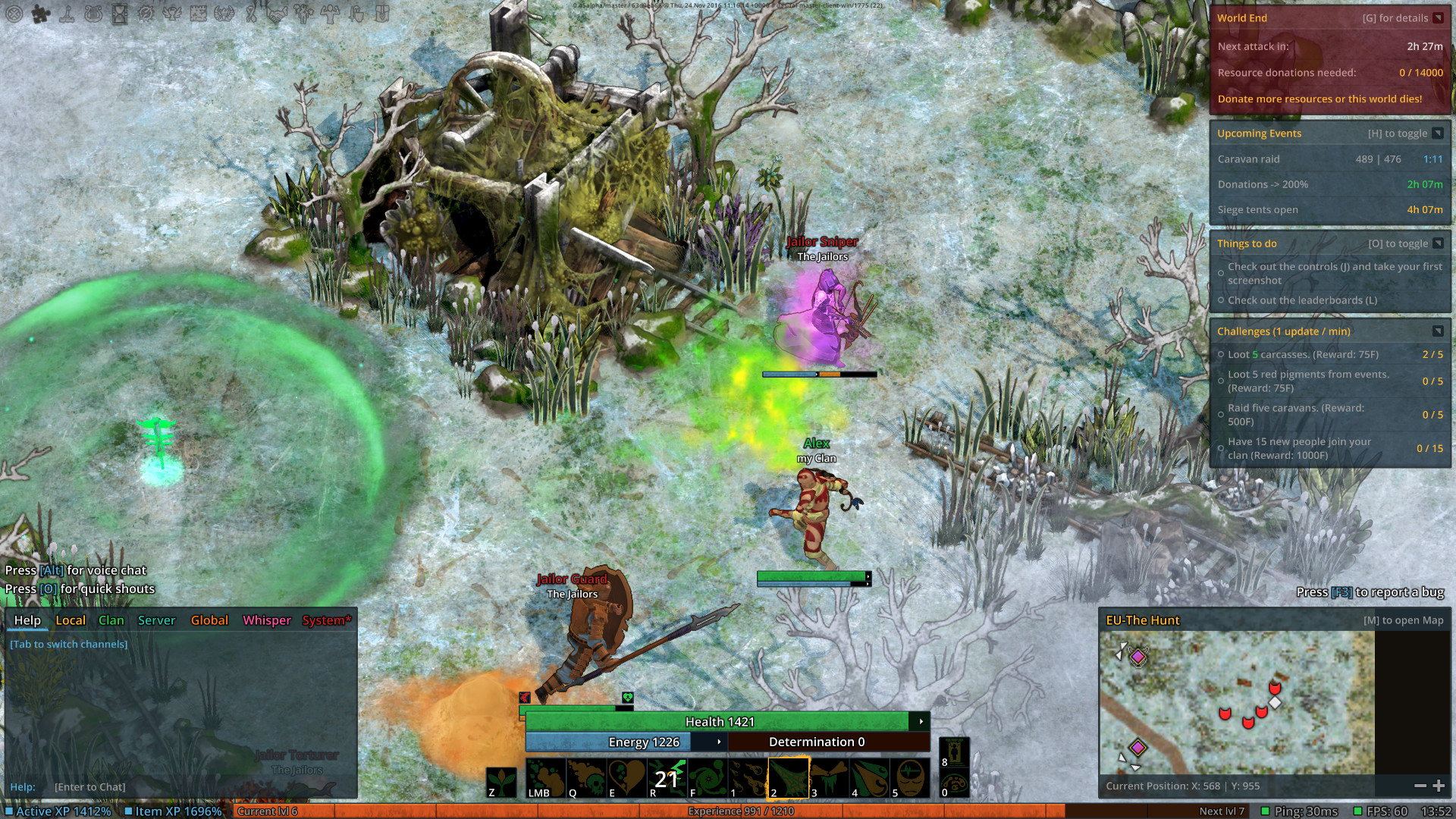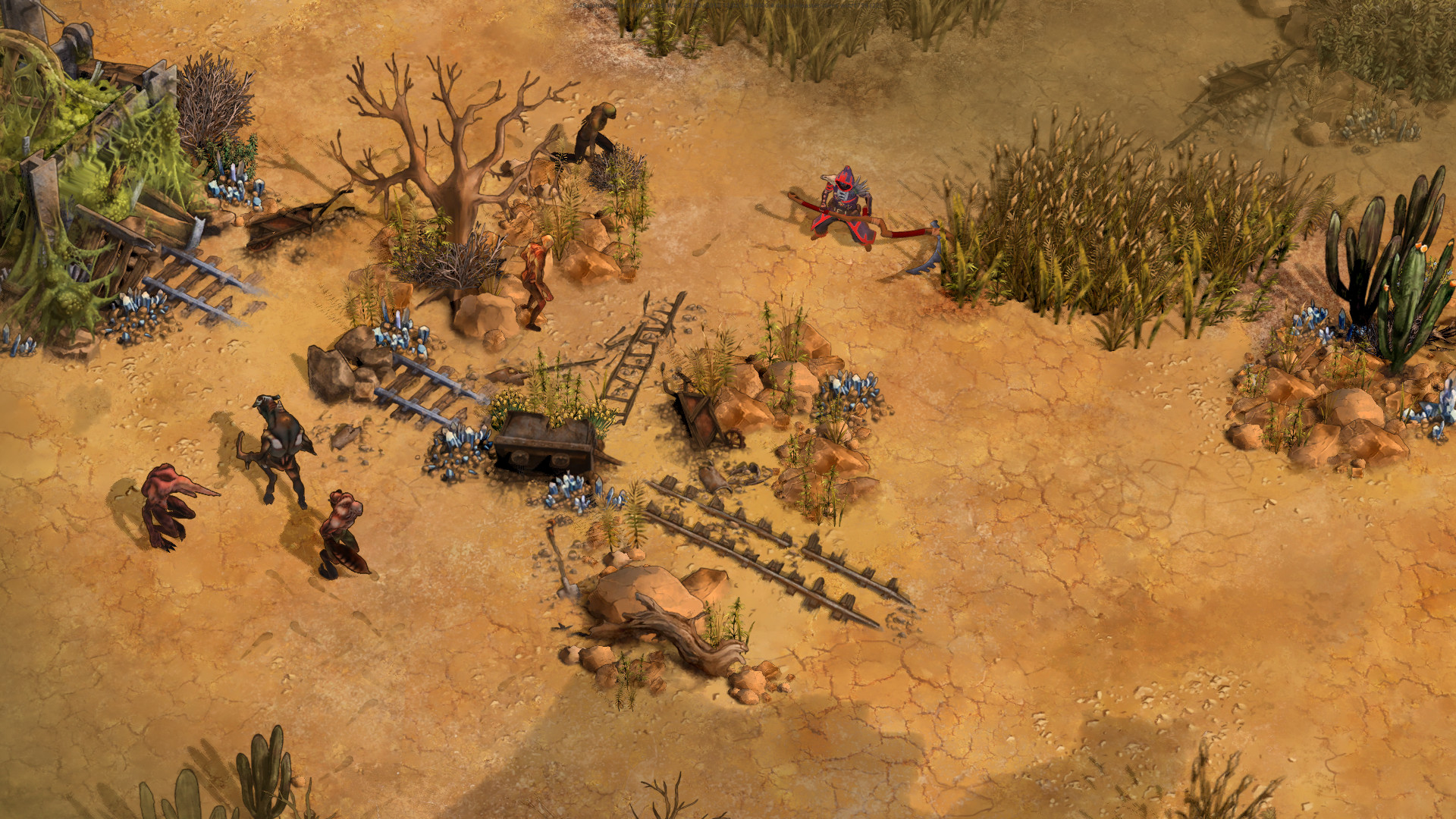The Exiled is a social sandbox MMORPG where survival strategy meets skill-based PvP combat. Cooperate or conquer, craft or combat; every decision is critical as you seek to flourish in a forsaken valley. A classless system means you shape your character to fit your style of play. With no grind, full loot and unrestricted PvP clashes, you must constantly balance risk and reward as you decide how to interact with the world and your fellow players. Craft equipment, construct your settlements and build alliances, as you explore challenging open world environments with unique geography and features. Each skirmish and siege will define your fate, as you vie to win your freedom from The Exiled.
-
-
-
Why we're creating The Exiled
To make a long story short: We love PvP but we hate having to grind for it. Doesn't matter if that grind means clicking on rocks and trees, farming rats or watching our mining lasers overheat on some asteroid. We just want to log into the game, find a friend or two and compete with an army twice our size. We want a game that takes us seriously as adults and allows us to make our own diplomatic decisions instead of throwing us in a battleground with a bunch of randomly selected "friends" and "enemies". We want a game that is constantly changing, keeping us on our toes and forcing us to get better instead of showering us with meaningless rewards and digital bauble.-
Meaningful PvP
- Open PvP: Engage other players in combat anywhere, anytime.
- Full loot: Carrying high-level equipment into combat means you risk losing it.
- Player-run clans: No pre-built factions. You decide who you ally with.
- City building and sieges: Build up your own towns - or raze those of your enemies.
Skill-based Combat
- Full friendly fire: Make sure your fireballs hit the enemy and not your allies.
- Line of sight: Hide behind a bush to ambush your enemies - and look behind you!
- Footsteps: Every player leaves them behind - want to be a bounty hunter?
Free Character Development
- 15 different class combinations: Have you ever played a Scythe-wielding mage?
- 80+ combat abilities: Build a lightning wall, lay explosive traps or shoot a hail of arrows.
- All equipment is player-crafted: You can tweak your gear to fit your play-style.
A Changing World in Conflict
The world of The Exiled is in a state of upheaval. A once peaceful and prosperous trading city turned from a multi-cultural melting pot into a stone cold dictatorship. You are on the receiving end of this societal change and together with hundreds of other misfits - criminals, political rebels and adventurers - you get exiled to a barren land -The Valley. Now you have to decide how to continue your life. Do you become a lone wanderer and live off the lands? Will you join the rebels and try to leave the valley by force? Or do you turn to your baser instincts and survive by robbing your fellow inmates?
Story Timeline Reveal - The Past (Part 1) + Giveaway Announcement
The way it works is each Monday we will share more story details here and later in the week (at random), we will ask a question on our Facebook page . For those who answer the question correctly, you will be entered into a random drawing and we will pick 1 winner each week. That winner will get a Steam key for The Exiled.
Below is this week's story reveal, the past. Since the past holds such a rich history, we are breaking it into 2 parts. Check back next Monday for part 2 and don't forget to like us on Facebook for the giveaway question.
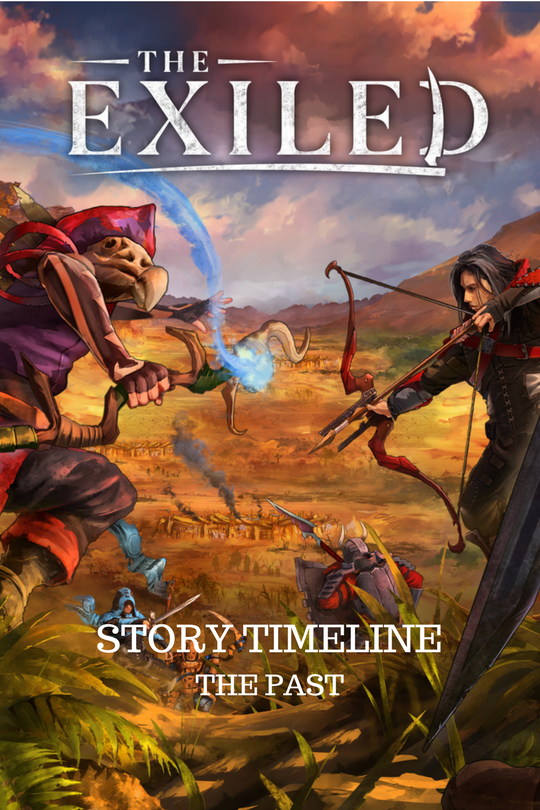
Why is the valley this way, you ask? Why choked, poisoned, dried to dust and walled off from the world around? Why are folk prisoned here? Why do the Katakani guards keep us in check? It is a long story, and one of which I only know the bare bones.
The Mekari
Once, fisherfolk, farmers and herders lived along the river that ran through this valley. It was the Mekar river, and they called themselves Mekari in its honour. None now know where they came from; they had always been here. They told tales of a time that they might have been more - old artefacts, strange formations of stone and ruined buildings showed that the valley had been greater once. But they were simply tales; none knew what the truth might be.
The river Mekar flowed from north to south through this valley to where it opened into the sea, its mouth a delta of sand and rock. The Mekar had cut deep into the surrounding land, the walls of the valley steep, craggy and inaccessible. The only route was to the sea.
Katakan - A Jewel in the East
The valley was a fertile, rich place, a place of fish and farming, of lush greenery and burgeoning wealth. It was due to the valley’s wealth that the fishing port of Katakan at the river’s delta became a trade destination for many up and down the coast, growing from a few stilted huts to a bustling city of bridges and riverways. Because of the upper valley’s inaccessibility, Katakan became the gatekeeper of the wealth of the valley, controlling the traffic of the river Mekar. It became rich, and rose in power and craft, becoming known as Katakan, Jewel of the East. None equalled it in sea power, the long craft of Katakan a familiar sight along the coast. The Sayatchi riders from the north west traded with the city, as did the Atiba caravans from the north-eastern desert, even the Ticaret sailors from over the sea. They became familiar figures. Some stayed. The city broadened in outlook, becoming something more than Mekari.
Katakan had been ruled by a group of elders, as was the case for all Mekari settlements. This group widened to allow advisors from amongst those foreigners who settled. In time, those advisors were treated as elders in their own right, and it became a full council.
The Mekari valley rose in power as Katakan rose. Wealth flowed from the city up the valley in the form of forged tools, woven cloth and other finished goods, medicines, even a few luxuries; raw resources flowed the other way. With wealth, more settlers came.
The valley’s resources started to be stretched - leeched by the flow of goods down the river to the city. Fish stocks were overfished, fertile ground became overfarmed, forests vanished faster than they grew. But this could be reversed, surely, over time, as more techniques were introduced?
Then the stars fell.
Starfall
Three nights of chaos as fire rained from the sky across all of the surrounding lands. The fertile valley was bombarded, destroying crops, killing livestock, sending up great gouts of steam from the Mekar. And Katakan burned. The air was grey with choking ash for weeks, and it ate away at lungs and skin.
It passed. The Mekari people survived. But the world was changed. The northern stretches of the Mekar were poisoned, and the foulness spewed filth downriver towards Katakan and the sea, killing and altering many plants and animals. The land, already weakened by over-farming, could not cope with the flood of poisoned water, and our once-fertile valley became desolation.
Wrecked and scorched, Katakan survived. The citizens set about rebuilding. But they decided that the sick waters of the Mekar could not be allowed to pollute the sea, and so the great dam was constructed at Katakan; and at the valley’s head, many of the smaller streams were diverted away from the valley to feed new irrigation. That decision signed the death warrant of the valley and those in it.
Tangam - A World Forged Anew
Over time, the world discovered what else the rain of fire had brought - a great quantity of ore-bearing rock. This star-metal was mined, reworked, found to offer great strength despite its lightness. Tangam, it was called, and became the chief material of the rebuilding and, later, the focus of all trade for those outside the valley. Tangam was flexible, easy to work and held a keen edge. Before that we had used copper, tin and bronze, and they could not compare - tangam opened up a wide range of new tools and weapons. Those who controlled the tangam controlled the future, and many peoples across the world found their way of life changed; some for the better, but some - the slower to adapt - were ground under heel.
The people who were isolated in this valley scraped a living, but were forgotten, lost, as Katakan rebuilt its links with the world and shuttered them away. They became known as the Sasar, the Lost. The name Mekari changed, and was nothing more than a name for the people of a particular heritage who lived in Katakan and on the surrounding coast.
The memory of Katakan’s old glories did much to strengthen it now in the minds of others. Through careful negotiation and trade, it rose once again, relying now on resources from the sea and from trade rather than from the valley.
The Mekar river, poisoned and polluted, dwindled and dried leaving only sick and silted pools. The valley, choked with poison, became desolation. Only at the far north was there greenery, amongst the waterfall-riven rocks. There, as the waters dried up, ruins were revealed - ghosts of an older time.
The Rise of Dian Batari
In the city hard choices were made. Katakan no longer lived off the wealth of the valley; it had to fight for its place, relying on skilful trade and a long reputation. But it seized the moment and it grew. Trading houses rose based on Katakan’s position as a meeting point of sea-trading nations. These houses were families of power and distinction, winning their places by treading on others. The rule of the city became the rule of the merchants. And the merchants’ council, by popular acclaim, was chaired by a first amongst equals, First Speaker.
‘First amongst equals’ and ‘popular acclaim’ quickly became ‘de facto dictator’ and ‘whoever has the most money’, as such systems often do.
Within the span of a hundred years after Starfall, House Batari were the effective rulers of Katakan, and Dian Batari rose to become the First Speaker. You know of her, I think. She is a shrewd woman and a skilled orator, with the money to have a strong military force on her side, and the support of several of the larger religious sects. She sent Katakan troops regularly patrolled the lands up and down the coast, seeking out tangam ore and making sure that they controlled it.
The Revenants and The Outcasts
Patrols even braved the valley of the Mekar, seeking fallen stars. But instead they found desolation, ruin, and strange mutated beasts. It seemed that the human survivors were no more; they had changed, mutating into horrific forms haunting their former settlements. Patrols who survived long enough to explore found fallen stars, but no tangam ore. Here, unlike anywhere in the surrounding lands, the fallen stars were worthless.
The Katakani called the creatures Revenants. The valley was sealed as too dangerous; with no tangam present, no wealth, there was no need to search for it.
Instead Dian Batari declared the place a dumping ground, both for the trash of the city and for those who had no place in her modern Katakan - criminals, political opponents, those resisting Batari takeover bids, and anyone else who resisted Dian’s drive for authority . Katakan laws have evolved from tribal custom and merchant statutes - it is not a simple matter to simply kill criminals convicted of lesser crime, or to slaughter the undesirables. Life is sacred, after all. Instead, Batari invoked the old law of tribal exile; the unwanted are herded into the valley and left to their own devices.
Others made their own way to the valley. Some followed stories of treasures, in the belief that Katakan was hiding something behind the wall. Some sought knowledge. Some simply sought adventure against the creatures there.
Whoever they are, those who have come to the valley are called Outcasts and, my friends, you are amongst them now.
Hello everybody,
Our release date is getting closer and we feel like it's a great time to start expanding on The Exiled's deep history and story. Moving forward, we will be revealing more about the world of The Exiled every Monday. Not only that, but we will also be holding a giveaway on our Facebook page.
Giveaway Details:
The way it works is each Monday we will share more story details here and later in the week (at random), we will ask a question on our Facebook page . For those who answer the question correctly, you will be entered into a random drawing and we will pick 1 winner each week. That winner will get a Steam key for The Exiled.
Below is this week's story reveal, the past. Since the past holds such a rich history, we are breaking it into 2 parts. Check back next Monday for part 2 and don't forget to like us on Facebook for the giveaway question.

The Past - Part 1
Why is the valley this way, you ask? Why choked, poisoned, dried to dust and walled off from the world around? Why are folk prisoned here? Why do the Katakani guards keep us in check? It is a long story, and one of which I only know the bare bones.
The Mekari
Once, fisherfolk, farmers and herders lived along the river that ran through this valley. It was the Mekar river, and they called themselves Mekari in its honour. None now know where they came from; they had always been here. They told tales of a time that they might have been more - old artefacts, strange formations of stone and ruined buildings showed that the valley had been greater once. But they were simply tales; none knew what the truth might be.
The river Mekar flowed from north to south through this valley to where it opened into the sea, its mouth a delta of sand and rock. The Mekar had cut deep into the surrounding land, the walls of the valley steep, craggy and inaccessible. The only route was to the sea.
Katakan - A Jewel in the East
The valley was a fertile, rich place, a place of fish and farming, of lush greenery and burgeoning wealth. It was due to the valley’s wealth that the fishing port of Katakan at the river’s delta became a trade destination for many up and down the coast, growing from a few stilted huts to a bustling city of bridges and riverways. Because of the upper valley’s inaccessibility, Katakan became the gatekeeper of the wealth of the valley, controlling the traffic of the river Mekar. It became rich, and rose in power and craft, becoming known as Katakan, Jewel of the East. None equalled it in sea power, the long craft of Katakan a familiar sight along the coast. The Sayatchi riders from the north west traded with the city, as did the Atiba caravans from the north-eastern desert, even the Ticaret sailors from over the sea. They became familiar figures. Some stayed. The city broadened in outlook, becoming something more than Mekari.
Katakan had been ruled by a group of elders, as was the case for all Mekari settlements. This group widened to allow advisors from amongst those foreigners who settled. In time, those advisors were treated as elders in their own right, and it became a full council.
The Mekari valley rose in power as Katakan rose. Wealth flowed from the city up the valley in the form of forged tools, woven cloth and other finished goods, medicines, even a few luxuries; raw resources flowed the other way. With wealth, more settlers came.
The valley’s resources started to be stretched - leeched by the flow of goods down the river to the city. Fish stocks were overfished, fertile ground became overfarmed, forests vanished faster than they grew. But this could be reversed, surely, over time, as more techniques were introduced?
Then the stars fell.
Starfall
Three nights of chaos as fire rained from the sky across all of the surrounding lands. The fertile valley was bombarded, destroying crops, killing livestock, sending up great gouts of steam from the Mekar. And Katakan burned. The air was grey with choking ash for weeks, and it ate away at lungs and skin.
It passed. The Mekari people survived. But the world was changed. The northern stretches of the Mekar were poisoned, and the foulness spewed filth downriver towards Katakan and the sea, killing and altering many plants and animals. The land, already weakened by over-farming, could not cope with the flood of poisoned water, and our once-fertile valley became desolation.
Wrecked and scorched, Katakan survived. The citizens set about rebuilding. But they decided that the sick waters of the Mekar could not be allowed to pollute the sea, and so the great dam was constructed at Katakan; and at the valley’s head, many of the smaller streams were diverted away from the valley to feed new irrigation. That decision signed the death warrant of the valley and those in it.
Tangam - A World Forged Anew
Over time, the world discovered what else the rain of fire had brought - a great quantity of ore-bearing rock. This star-metal was mined, reworked, found to offer great strength despite its lightness. Tangam, it was called, and became the chief material of the rebuilding and, later, the focus of all trade for those outside the valley. Tangam was flexible, easy to work and held a keen edge. Before that we had used copper, tin and bronze, and they could not compare - tangam opened up a wide range of new tools and weapons. Those who controlled the tangam controlled the future, and many peoples across the world found their way of life changed; some for the better, but some - the slower to adapt - were ground under heel.
The people who were isolated in this valley scraped a living, but were forgotten, lost, as Katakan rebuilt its links with the world and shuttered them away. They became known as the Sasar, the Lost. The name Mekari changed, and was nothing more than a name for the people of a particular heritage who lived in Katakan and on the surrounding coast.
The memory of Katakan’s old glories did much to strengthen it now in the minds of others. Through careful negotiation and trade, it rose once again, relying now on resources from the sea and from trade rather than from the valley.
The Mekar river, poisoned and polluted, dwindled and dried leaving only sick and silted pools. The valley, choked with poison, became desolation. Only at the far north was there greenery, amongst the waterfall-riven rocks. There, as the waters dried up, ruins were revealed - ghosts of an older time.
The Rise of Dian Batari
In the city hard choices were made. Katakan no longer lived off the wealth of the valley; it had to fight for its place, relying on skilful trade and a long reputation. But it seized the moment and it grew. Trading houses rose based on Katakan’s position as a meeting point of sea-trading nations. These houses were families of power and distinction, winning their places by treading on others. The rule of the city became the rule of the merchants. And the merchants’ council, by popular acclaim, was chaired by a first amongst equals, First Speaker.
‘First amongst equals’ and ‘popular acclaim’ quickly became ‘de facto dictator’ and ‘whoever has the most money’, as such systems often do.
Within the span of a hundred years after Starfall, House Batari were the effective rulers of Katakan, and Dian Batari rose to become the First Speaker. You know of her, I think. She is a shrewd woman and a skilled orator, with the money to have a strong military force on her side, and the support of several of the larger religious sects. She sent Katakan troops regularly patrolled the lands up and down the coast, seeking out tangam ore and making sure that they controlled it.
The Revenants and The Outcasts
Patrols even braved the valley of the Mekar, seeking fallen stars. But instead they found desolation, ruin, and strange mutated beasts. It seemed that the human survivors were no more; they had changed, mutating into horrific forms haunting their former settlements. Patrols who survived long enough to explore found fallen stars, but no tangam ore. Here, unlike anywhere in the surrounding lands, the fallen stars were worthless.
The Katakani called the creatures Revenants. The valley was sealed as too dangerous; with no tangam present, no wealth, there was no need to search for it.
Instead Dian Batari declared the place a dumping ground, both for the trash of the city and for those who had no place in her modern Katakan - criminals, political opponents, those resisting Batari takeover bids, and anyone else who resisted Dian’s drive for authority . Katakan laws have evolved from tribal custom and merchant statutes - it is not a simple matter to simply kill criminals convicted of lesser crime, or to slaughter the undesirables. Life is sacred, after all. Instead, Batari invoked the old law of tribal exile; the unwanted are herded into the valley and left to their own devices.
Others made their own way to the valley. Some followed stories of treasures, in the belief that Katakan was hiding something behind the wall. Some sought knowledge. Some simply sought adventure against the creatures there.
Whoever they are, those who have come to the valley are called Outcasts and, my friends, you are amongst them now.
[ 2017-02-13 19:00:19 CET ] [Original Post]
Minimum Setup
- OS: Ubuntu 12.04 or SteamOS
- Processor: Intel Dual-Core 2.4 GHzMemory: 2 GB RAM
- Memory: 2 GB RAM
- Graphics: Shader model 3.0 and 1 GB VRAMNetwork: Broadband Internet connection
- Storage: 2 GB available spaceAdditional Notes: The Exiled is still in development. System requirements are subject to change.
GAMEBILLET
[ 6358 ]
FANATICAL
[ 5876 ]
GAMERSGATE
[ 750 ]
MacGameStore
[ 1993 ]
INDIEGALA
[ 1017 ]
FANATICAL BUNDLES
GMG BUNDLES
HUMBLE BUNDLES
INDIEGALA BUNDLES
by buying games/dlcs from affiliate links you are supporting tuxDB

